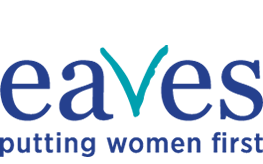Eaves declares “Women in Crisis” after a 70% increase in demand for services

In the wake of the passing of their recent Chief Executive, Denise Marshall, Eaves has condemned the onslaught on all areas of women’s lives.
“We have seen a 70% increase in demand for services in the first six months of 2015 compared to the last six months of 2014. Yet, not only have we not seen a corresponding increase in funding; but, on the contrary, only cuts and closures across the specialist women’s sector”, says Dr. Louisa Cox, chair of Eaves.
“We are particularly focusing on destitution, trafficking and sexual exploitation. What we are seeing is more women with more complex needs requiring more advocacy and more time to make progress in their cases,” she continues.
The picture is mirrored across the sector. Black and Asian women disproportionately access services for violence against women yet two thirds of organisations recognize they can only partially meet BME women’s needs (Imkaan 2015). Eaves, is a Rape Crisis centre and a member of Women’s Aid. None of the 46 rape crisis centres has any government funding confirmed beyond March 2016. Women’s Aid found that on a snapshot of one week in June, 369 women were turned away from refuges because of lack of suitable space. However, it’s not just about a roof over a woman’s head, it’s the whole complex web of support needed to move on.
Why is it so bad and what does it mean?
Lynne, a support worker at Eaves, explains, “So many services have closed and other services, facing cuts, have to turn away complex cases that we then pick up. Gatekeeping has become ever more stringent and access to vital services that enable women to access their rights and facilitate their recovery such as housing, mental health, legal aid have all but disappeared. As a result we have to spend many more hours advocating for their rights and struggling to find somewhere to move women on.”
In the meantime, not only are women left high and dry but perpetrators of violence against women get away with it; “The thing is, we want to see perpetrators held to account but cooperating with a prosecution is hardly going to be the first priority of a woman in this situation.”
What women tell us they want and what works
There is endless rhetoric from funders and government about “putting women at the heart of the services and increasing service user voice.” That’s precisely what we do but the government isn’t listening:
“Some women can’t cope with having men around. Men can be intimidating and remind you of the circumstances that got you into the situation you’re in. Sometimes it’s nice to be in a space away from men.” (Christine*)
“There’s a trend to do away with specialist and women only services in the mistaken belief that this will save money but frankly this is a false economy. Evidence and experience proves them wrong.”
A perfect storm
Cox highlights that we are in a perfect storm. She references the Fair Deal for Women report which found that government has chosen to tackle the deficit through 90% cuts and only 10% taxation and it is women who have paid off 79% of the deficit to date.
“We find that it is more likely to be women in low-paid, insecure, part-time and public sector work, it is more likely to be women with caring responsibilities who may have to top up their incomes or rely exclusively on benefits and it is more likely to be women who need to rely on public, voluntary sector and specialist services”, says Lynne (support worker). “Yet these are precisely the areas being cut. Fawcett has also tracked this combination of circumstances and describes it as “triple jeopardy” for women and that’s just what it is.”
Cox stresses that not only is this a huge breach of government’s obligations to equally provide access to safety and justice to all its citizens but it is going to cost us more in the long run. It is wasting women’s potential and storing up more trouble and expense as women’s and children’s lives are devastated by such reckless discrimination.
Turn back the tide!
Halt the crisis!
We have the answer – we know what works: let us do it!
Please support women in crisis by donating today.
Our success stories
Women in Crisis

2nd September 2015
Prostitution and survival. Nina had been involved in prostitution from a very young age. She had been finding… read more
Women in Crisis

2nd September 2015
Being trafficked into the UK. Noreen was born to a poor family in Pakistan. She went on to work as a domestic… read more
Women in Crisis

2nd September 2015
Abuse and destitution. Lynne, support worker, tells us how Celine was supported. When I first met Celine, she… read more



